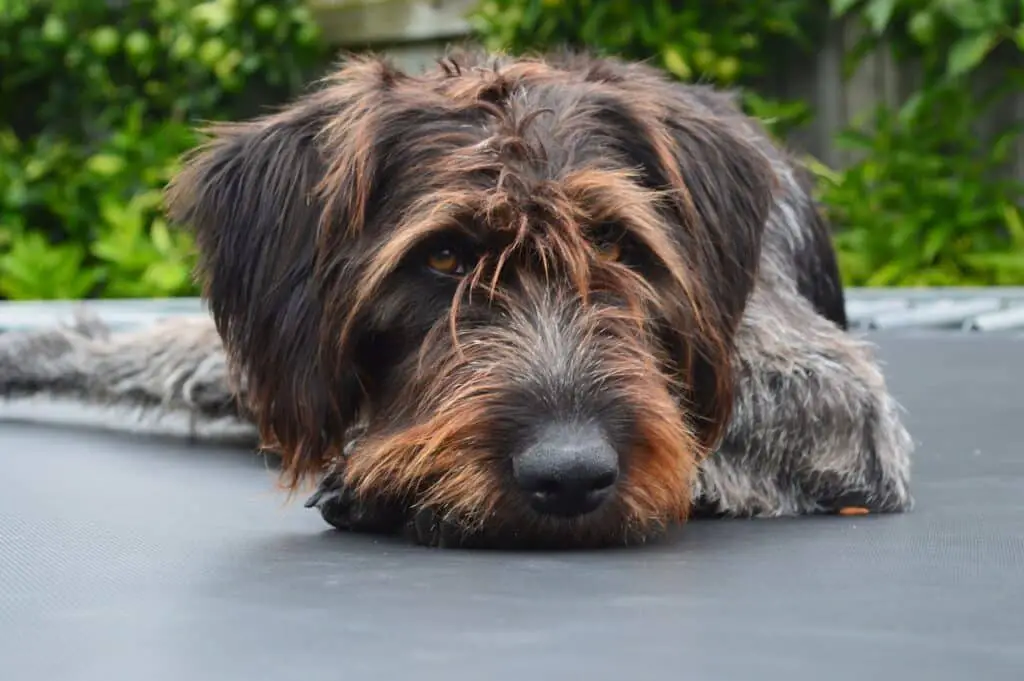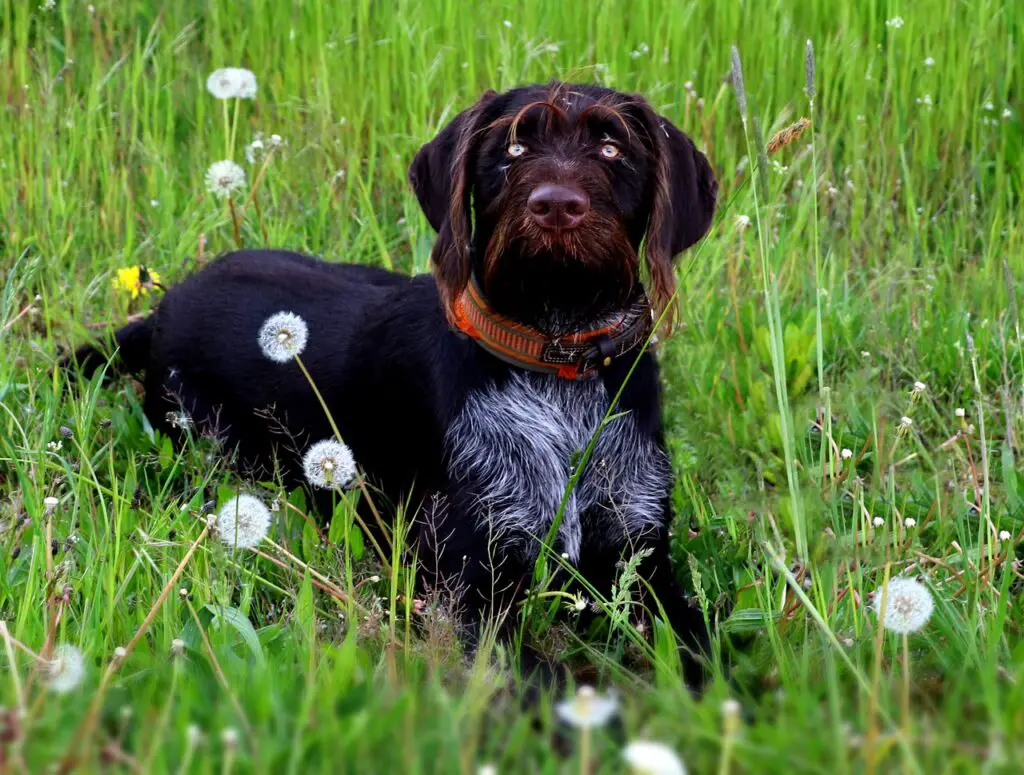German Wirehaired Pointers (GDR) is a good breed for families.
They’re intelligent and quick to adapt to the home lifestyle.
The breed feels like a huge part of your family when brought into one’s home.
With such commendable qualities, you may be wondering if these lovely companions shed, and if they do, can you tolerate it?
So, do German Wirehaired Pointers shed?
Yes, they do.
As with most dog breeds, they shed all year round.
Since their coat is dense, they shed only small amounts at a time.
Shedding is most common when spring arrives and at the start of winter.
You can control shedding to a manageable level by regularly grooming and keeping their fur off the carpet.
This article will look at German wirehaired pointers and see all there is to know about their shedding.
In addition, you’ll find tips on how to reduce this shedding.

Are German Wirehaired Pointers Hypoallergenic?
No, German Wirehaired Pointers shed very little, but they still produce dander that causes allergies in some people.
It is common for dogs to shed.
They lose their hair and leave it behind everywhere they go.
The term “hypoallergenic” refers to a dog breed that supposedly produces fewer allergens or proteins that can cause allergic reactions in humans.
While shedding, they also secrete dander – dead skin cells – and saliva.
Dander and shed fur are allergenic to many people who sneeze and wheeze when exposed to their dog’s allergens.
Many people with allergies can cope with German Wirehaired Pointers without experiencing any problems, while others will be allergic to their hair and dander.
So, stay away from this and other dog breeds that shed a lot if you have a severe allergy to them.

Why do German Wirehaired Pointers Shed Hair
German Wirehaired Pointers are known for their large size and beautiful coats, which can come in various colors.
Unfortunately, like most other breeds, they shed hair, which can be inconvenient at times.
German Wirehaired pointers shed their hair because they have two fur coats; one soft undercoat and a longer outer coat.
The outer coat protects them from the elements and keeps them warm in the cold weather, but it also sheds year-round.
In the winter, the soft undercoat keeps them warm. In the summer, it keeps them cool.
Like all other dogs, German Wirehaired Pointers shed hair for several reasons.
Most commonly is to get rid of old and dead hair.
This happens all year round, but you can expect the heaviest shedding between the seasons.
Brushing is required every day during the shedding period for as long as it lasts.
It’s a common springtime occurrence and not a cause for concern.
The dog’s skin sheds naturally, so it’s a normal part of this process.
Why German Wirehaired Pointers May Shed Excessively
When your German Wirehaired Pointer sheds more than usual, it can be frustrating.
Below are some of the most common reasons for excessive shedding in German Wirehaired Pointers:
Environmental Allergies
Allergens from pollen and dust mites can cause a reaction in your dog’s skin, resulting in excessive hair loss.
Environmental allergies can cause dogs to lose their hair and develop bald patches.
For instance, some dogs are allergic to grass and other plants that grow outdoors.
In addition, if you live near farms or ranches with livestock, your dog might be exposed to allergens that trigger allergic reactions.
If you suspect your GWP has an allergy, take them to a veterinarian who can run tests and determine what they’re allergic to.
They may prescribe medication or recommend changes to your dog’s diet to help end their suffering.
Food Allergies
Food allergies can also cause excess hair loss in GWPs.
A dog’s allergies can arise from something in his regular kibble.
Additionally, they can arise from overeating one type of food over time (such as corn).
In either case, changing their diet should help end the problem.
Allergies can cause the dog’s skin to become inflamed and irritated, leading to excessive hair loss.
Your German Wirehaired Pointer may shed more than usual if they have any type of food allergy.
Consult your vet before changing their diet.
Your German Shepherd Pointer may need special medical treatment if they have anaphylactic reactions to some foods.
Medications
Some medications interfere with the normal shedding cycle, which can cause excessive shedding.
Medications like steroids or antihistamines may suppress certain hormones responsible for regulating the production of sebum (oil) in your dog’s skin.
This may cause their skin to become dry and flaky, making it more likely for dead hair to fall out easily.
Moreover, if your dog has recently started a new medication, it could be causing them to shed more hair than usual.
Fleas and Parasites
Fleas and parasites can cause itching and hair loss in dogs that live outdoors or are otherwise exposed to those pests regularly (such as hunting dogs).
Excessive shedding may result from this.
Suppose your dog has fleas or ticks on them regularly and does not respond well to topical treatments for these parasites.
In that case, it could be due to an underlying condition like mange or sarcoptic mange, which will require veterinary care before it is cleared up completely.
Pregnancy or Lactation
During pregnancy and lactation, hormonal changes can cause dogs to shed more than usual.
If you notice sudden changes in your dog’s coat during pregnancy or lactation, talk with your vet immediately so they can determine if there’s anything wrong with your pet’s health.
So, ensure that your dog gets plenty of exercise and healthy food during this time.
Diseases
Certain diseases can cause excess shedding as well.
For example, hypothyroidism (an underactive thyroid, cancer, and alopecia X (hair loss) can cause excessive shedding in your German Wirehaired Pointer.
How to Reduce Shedding in German Wirehaired Pointers
German Wirehaired Pointers have a thick coat that sheds all year round, especially in the spring and fall.
If you’re wondering how to reduce their shedding, here are some tips:
Regular Brushing
Regular brushing is key to reducing shedding in German Wirehaired Pointers to prevent their hair from getting all over your home.
Daily brushing will allow you to eliminate loose hair and unclog hair follicles on your dog’s body so that new hairs can grow in their place.
Brushing helps distribute natural oils throughout the coat and skin, so your dog stays healthy.
It’ll also help you remove ticks and fleas that have been stuck in their fur during walks outside.
Regular Bathing
A regular bath can also reduce shedding in German Wirehaired Pointers.
Bathe them once a week to help keep their skin healthy.
The dirt won’t be stuck under their skin or around their ears (which are extra sensitive), so they’ll shed less.
Quality Diet
Reduced shedding is also possible with a quality diet for German Wirehaired Pointers.
If you want to ensure your dog is eating highly nutritious food, ensure it contains whole grains rather than corn or rice fillers (as most commercial brands do).
The vet can help you figure out what foods are best for your GWP by reviewing your diet history over time (if available).
Conclusion
German Wirehaired Pointers have a coat that is considered medium length.
They shed on average every year but in small amounts.
Therefore, they’re not ideal dogs for those with extreme allergies or sensitivities.
Plus, they have a medium to a low amount of dander.
Therefore, as long as you brush them weekly and keep fur off the carpet, you can control shedding to a manageable level.
Moreover, feed them the correct amount for their breed and size, maintain a healthy weight and watch for fur loss.
They’ll reward you with unconditional love and loyalty if given the right care.
- What Dog Breeds Have Pink Skin? - March 24, 2023
- What Are the Most Inspiring Dog Breeding Quotes? - March 20, 2023
- Can Pheromone Spray Help Improve Dog Breeding Results? - March 19, 2023








